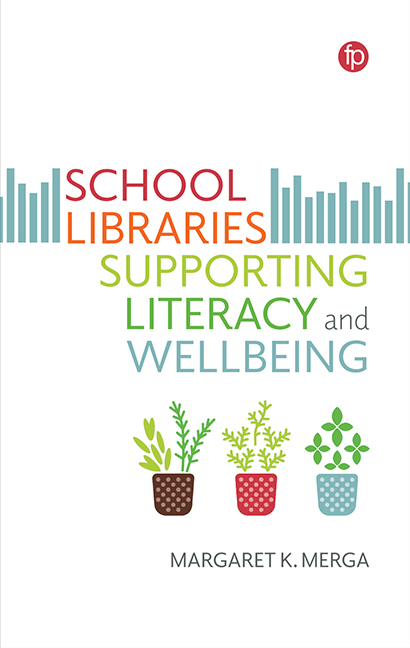Book contents
- Frontmatter
- Contents
- List of Tables
- Acknowledgements
- Abbreviations
- Introduction
- 1 What Do School Library Professionals Contribute to Student Learning and Support? A Focus on Australia and the UK
- 2 School Libraries and Reading Engagement for Literacy
- 3 Librarians Supporting Struggling Literacy Learners Beyond the Early Years
- 4 School Libraries and Reading Engagement for Student Wellbeing
- 5 School Libraries, Health Resourcing and Information Literacy
- 6 Librarians Creating Environments for Reading and Wellbeing
- 7 Challenges to Visibility and Advocacy for School Libraries and Staff
- Conclusions and Directions for Future Research
- Appendix 1 Background and Methods of My Research Projects
- Appendix 2 A Place to Get Away from It All: Five Ways School Libraries Support Student Wellbeing
- Index
Appendix 1 - Background and Methods of My Research Projects
Published online by Cambridge University Press: 21 April 2022
- Frontmatter
- Contents
- List of Tables
- Acknowledgements
- Abbreviations
- Introduction
- 1 What Do School Library Professionals Contribute to Student Learning and Support? A Focus on Australia and the UK
- 2 School Libraries and Reading Engagement for Literacy
- 3 Librarians Supporting Struggling Literacy Learners Beyond the Early Years
- 4 School Libraries and Reading Engagement for Student Wellbeing
- 5 School Libraries, Health Resourcing and Information Literacy
- 6 Librarians Creating Environments for Reading and Wellbeing
- 7 Challenges to Visibility and Advocacy for School Libraries and Staff
- Conclusions and Directions for Future Research
- Appendix 1 Background and Methods of My Research Projects
- Appendix 2 A Place to Get Away from It All: Five Ways School Libraries Support Student Wellbeing
- Index
Summary
This book includes discussion of findings from my research projects in libraries and literacy. In Table 1, you can find a list of these relevant projects; although I discuss some of the research work I’ve done in research communications in this book, I don't include those projects here to preserve the focus on libraries, literacy and wellbeing. If you want information about these research communications projects, please refer to my ResearchGate page: https://www.researchgate.net/profile/Margaret-Merga-2
I also provide further detail about studies that I have specifically directed the reader to within the book, where I have asked you to refer to Appendix 1 if you need more information around methods. I moved this information to this Appendix because I know that not everyone is that interested in methods, but they are important to me as a researcher, so I wanted to make sure that all of my interested readers and ‘methods heads’ could find the additional information about these projects.
I’ve assumed that if you’re reading this section, you have at least a basic understanding of research methods, so I won't be explaining the basics (e.g. the difference between qualitative and quantitative approaches). I’m a pragmatic researcher who has set up camp between paradigms, not locked into any method or supporting theory, just using whatever theories or approaches best service my need to solve real-world issues and meet enduser interests. Sometimes I even contribute to the generation of theory (e.g. Merga, 2017), but only if I can see a pragmatic purpose for doing that (i.e. informing interventions for reading engagement).
I also wanted to add that where I have used direct quotes in this book, in some instances such as where grammatical errors were present, I have lightly edited the quotes for readability where needed and possible, while retaining the meaning.
2020 TikTok and young people
You’ve probably noticed that I’m really into hybrid content analysis, and I used it for the content from the 2020 TikTok and Young People project that I include in this book. I’m not going to go into detail about what TikTok is; if you want that content, please read my paper (Merga, 2021a), or install the application on your device and familiarise yourself with it from a user perspective.
- Type
- Chapter
- Information
- School Libraries Supporting Literacy and Wellbeing , pp. 167 - 190Publisher: FacetPrint publication year: 2022



